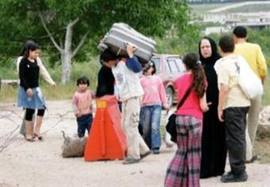 On the eve of winter, the government has asked donor countries to contribute $450 million to provide for the growing number of Syrian refugees in Lebanon, according to ministerial sources.
On the eve of winter, the government has asked donor countries to contribute $450 million to provide for the growing number of Syrian refugees in Lebanon, according to ministerial sources.
The number of registered refugees in Lebanon has now climbed to 118,633, even higher than in Turkey, but the real total is undoubtedly far larger, as many choose not to register.
The European Union and the U.S., among others, have already donated millions of dollars in aid to help with Syrian refugees in Lebanon, through the U.N. and its aid partners, but as the war next door drags on, the number of displaced Syrians entering the country continues to rise.
Prime Minister Najib Mikati chaired a meeting Monday to discuss the situation of the displaced at the Grand Serail with Social Affairs Minister Wael Abu Faour and Ninette Kelly, representative of the U.N. High Commissioner for Refugees in Lebanon.
Speaking to reporters after the meeting, Abu Faour said that the two main issues discussed during the meeting were the registration of refugees and the issue of shelter, perhaps the most serious problem facing displaced Syrians in Lebanon.
The registration of refugees was originally carried out jointly by the government’s emergency body – the Higher Relief Committee – and the UNHCR when the conflict in Syria first began in March 2011, but is now solely carried out by the refugee body.
It was agreed during Monday’s meeting, Abu Faour said, that a memorandum of understanding will soon be signed between the government and the UNHCR on the registration issue, and that a re-examination of the registration process will be undertaken.
Not, he stressed, because the government did not trust the statistics, but to lay down some guidelines in order to remove any opportunity for the exploitation of any refugees, or a situation whereby refugees were denied the right to be registered or receive access to benefits.
On the shelter issue, the minister said, “As you know, the number of refugees is increasing, and there are currently insufficient options to accommodate all refugees.”
Ruling out the possibility of erecting refugee camps, which house thousands of refugees in Turkey, Jordan and Iraq, Abu Faour discussed other options under consideration within the government, including using abandoned buildings as collective shelters, paying Lebanese families who are hosting Syrian refugees, and covering the rent of some of the poorest refugee families, all of which are already being implemented by the UNHCR and partners.
“We are on the eve of winter and there are [refugees with] pressing needs,” he said.
“These options exist, but not camps, or any other options which would not be acceptable on the humanitarian or political levels in Lebanon.”
The discussion will continue Tuesday with relevant ministries, through meetings of working teams.
“In principle, there will be a meeting for donor states, called for by Mikati, to ask them that they support Lebanon in handling its humanitarian duties toward refugees,” he explained.
Earlier, Mikati met with Danish Foreign Minister Villy Sovndal, who arrived in Beirut Saturday, and the Danish ambassador to Lebanon, Jan Top Christensen.
Speaking after his meeting with Mikati, Sovndal said that, “I visited the Bekaa Valley yesterday, where I examined the challenges facing Lebanon, due to the refugee population.”
Having spoken with Danish officials working with non-governmental organizations in the region, Sovndal expressed concern about the recent bad weather.
“We are also concerned about refugees inside Syria, as we are having difficulties reaching them due to the security situation.”
Alexander Adam, program manager for the Danish Refugee Council – one of the UNHCR’s implementing partners in Lebanon – said that this winter was proving a much harder challenge than last year, due to the rapidly increasing numbers of refugees.
“We have enough fuel to distribute to refugees until the end of December, but after that, it is a worry,” he added.
Sovndal, who will also meet with President Michel Sleiman, said that “We met today with the prime minister … discussions focused on challenges resulting from the crisis in Syria and its possible repercussions on Lebanon. We hope that the Syrian crisis will be resolved politically, which is very important for Lebanon as well.”
Daily Star

Leave a Reply
You must be logged in to post a comment.